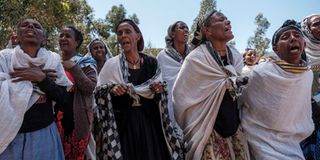Premium
Bring all Tigray civil war parties to the negotiating table for a peaceful Horn

Women mourn victims of a massacre allegedly perpetrated by Eritrean soldiers in the village of Dengolat, North of Mekele, the capital of Tigray on February 26, 2021.
Dictatorship and democracy are as old as the hills. Despite the defeat of Fascism in 1945 and the fall of Soviet Communism in 1989, countries have swung, like a roller coaster, between democracy and dictatorship. What is certainly new is eclipsing of democracy by authoritarianism in the 21st century.
Tyranny and oppression, James Madison predicted, will come “in the guise of fighting a foreign enemy”. It is also riding the crest of the wave of micro-nationalisms, isolationism and other anti-globalisation tendencies.
Rattled by fear that “illiberal powers” have become emboldened and gained influence in the global arena, scholars are fretting as ‘Authoritarianism Goes Global’, to borrow the evocative title of the 2016 book by Larry Diamond and co-authors.
America is just recovering from its worst bout of authoritarianism under Donald Trump!
Africa has every reason to get goose pimples all over when authoritarianism is mentioned. If Cold War-era despots in Asia steered “Asia Tigers” to development, Africa’s strongmen left trails of poverty, disease, genocides and civil wars behind them. Although the Horn of Africa, to be sure, is not new to sit-tight despots and tin-pot dictators, its citizens are justifiably ill at ease over the return of authoritarianism.
Tragic civil war
Resurgent authoritarianism is haemorrhaging pivotal states. Once ranked by the World Bank as the third-fastest growing country of 10 million or more people in the world from 2000 to 2018, Ethiopia has plunged into a tragic civil war – its worst since 1990.
What started in November last year as a dispute over deferment of elections has morphed into a full-scale civil war in the Tigray region, now in its seventh month. The war has killed thousands, displaced nearly 100,000 others as refugees in Sudan, with an estimated 4.5 million others in need of assistance.
Ethiopia is also caught up in a dispute with Sudan over the al-Fashaga border and a protracted dispute with Egypt and Sudan over the Grand Ethiopian Renaissance Dam (GERD). The two disputes risk spiralling into a regional conflict.
Somalia, too, has teetered on the brink of civil war. Ethiopia’s move to defer elections and use parliament to extend Abiy’s term in office has eerie echoes in Somalia, where parliament voted to extend President Mohamed Farmaajo’s mandate (which expired in February) by two years. This sparked violent clashes involving government troops and opposition supporters. Journalists were arbitrarily arrested and persecuted as authoritarianism bared its teeth.
Shelled residential neighbourhoods
The crisis came to a head on April 26. Government troops shelled residential neighbourhoods in Mogadishu, killing civilians, injuring others and destroying property. The attacks targeted homes of presidential candidates in what was seen as Villa Somalia’s attempt to decapitate the opposition.
Mercifully, Farmajo’s key allies, Galmudug State President Ahmed Abdi Karie (“Qoor Qoor”), his Hirshabelle counterpart, Ali Abdullahi Hussein and Prime Minister Mohamed Hussein Roble, repudiated term extension and supported the September 17, 2020 Election Agreement. Somalia’s crisis has only buoyed al-Shabaab terror group.
Somalia’s ally, Eritrea, is the poster child of strongman rule in the Horn. Since 1993, President Isaias Afwerki’s People's Front for Democracy and Justice (PFDJ) has remained the sole legal party. While national elections have been periodically scheduled, none were ever held. After 2018, Eritrea appears to have stealthily, but aggressively, exported its sit-tight model to its allies in Ethiopia and Somalia.
What was initially hyped and rewarded as a trailblazing ‘peace treaty’ on July 8, 2018 – that formally ended two decades of border conflict between Eritrea and Ethiopia – is no more than a military pact against the Tigrayan power elite as an enemy to Asmara since the 1998-2003 war with Ethiopia and to Addis Ababa since 2018. This is the logic for the entry of Eritrean forces into the war in Tigray. This, and the widely reported use of UAE drones based in the Eritrean port of Assab to support Abiy, has turned the civil war to a regional conflict.
A new genre of assertive diplomacy is needed stem authoritarianism and stabilise the Horn. The appointment of Ambassador Jeff Feltman as the US Special Envoy for the Horn of Africa on April 23, 2021 marks a significant step.
A desired solution is to get parties to the Tigray conflict to commence negotiations, Addis Ababa to provide unimpeded access by humanitarian actors to populations ravaged by war, and Eritrea to immediately withdrawal its forces. Egypt, Ethiopia and Sudan should be encouraged to resume talks hosted by DRC (as the current Chair of the African Union – which collapsed on April 6, 2021.
The proposed Horn of Africa Cooperation, a triple alliance of Ethiopia, Somalia and Eritrea, has weakened regional consensus.
Ethiopia was the sole member of the AU Peace and Security Council that voted in favour the term extension in Somalia! IGAD, which has been mute on the Tigray conflict, has to reclaim its bold voice. Similarly, the AU, with its headquarters in Addis Ababa, has dithered over the Ethiopian civil war.
Feltman will benefit from close collaboration with regional agencies, experts and other envoys, including the UN Special Envoy for the Horn of Africa, Parfait Onanga-Anyanga, the Igad Special Envoy, Dr Mohamed Guyo and UNHCR Special Envoy for the Horn of Africa, Ambassador Mohammed Affey.
He will also find a useful ally in Kenya.





